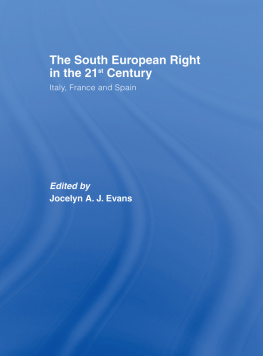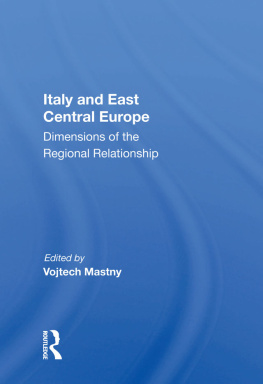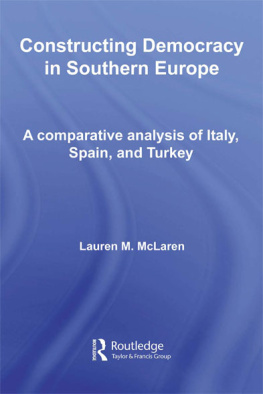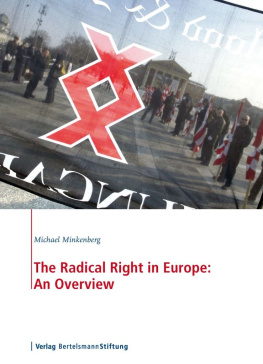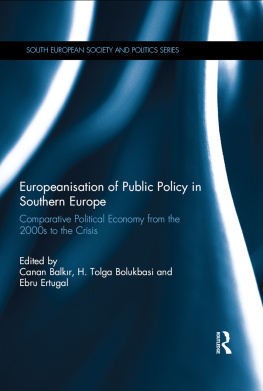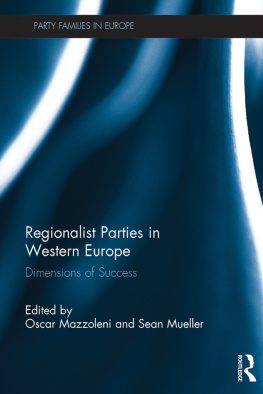The Southern European Right in the 21st Century
Since the European-wide domination of social democratic governments during the mid- to late-1990s, Right-wing parties have returned to power in the three largest Mediterranean democracies Italy, France and Spain. This alternation has been symptomatic of growing majoritarianism in Southern Europe, a trend which has gone against much of the rest of the continent, and of a decline in clientelist effectiveness also traditionally seen as the Southern norm. Whilst in all cases the election of Conservative forces represented a rejection by voters of perceived stagnation amongst Left-wing governments, the Italian and French contexts led to a widespread perception of democratic failure, both in the high-profile presence of extremists at the ballot and in the corruption-tainted reputations of the coalition leaders Silvio Berlusconi and Jacques Chirac. This contrasts strongly with the Spanish case, where the first victory of Jose Maria Aznars Popular Party over the Socialists confirmed the consolidation of Spanish democracy and the virtual exclusion of extremist forces at the electoral level.
This book assesses the subsequent periods of incumbency of these three governments, considering the salient features of each in their reaction to winning government and implementing policy, given their divergent historical roots and paths to power. In particular, it focuses on the evolving role of perceived extremist elements on the Right, and adaptation to a European arena which imposes a level of continuity on incumbents of whatever hue, attempts to defend national interests notwithstanding. Lastly, it considers the extent to which the swing to the Right has already reached its peak, given the evidence of recent national and regional elections in France and Spain.
This book was first published in 2005 as a special issue of South European Society and Politics.
Jocelyn A. J. Evans is a reader in Politics at Salford University.
The South European Right in the 21st Century
Italy, France and Spain
Edited by
Jocelyn A. J. Evans
First published 2008 by Routledge
2 Park Square, Milton Park, Abingdon, Oxon, OX14 4RN
Simultaneously published in the USA and Canada by Routledge
270 Madison Avenue, New York, NY 10016
Routledge is an imprint of the Taylor & Francis Group, an informa business
2008 Evans, J.A.J.
All rights reserved. No part of this book may be reprinted or reproduced or utilised in any form or by any electronic, mechanical, or other means, now known or hereafter invented, including photocopying and recording, or in any information storage or retrieval system, without permission in writing from the publishers.
British Library Cataloguing in Publication Data
A catalogue record for this book is available from the British Library
Library of Congress Cataloging in Publication Data
A catalog record has been requested
ISBN 13: 978-8-415-35636-7 (hbk)
ISBN 10: 0-415-35636-9 (hbk)
Jocelyn A. J. Evans
In 2003, it appeared that the conservative right in the largest Mediterranean democraciesFrance, Italy and Spainhad consolidated their hold on power. The Gaullists 2002 legislative election obliteration of the Socialist incumbents after Jacques Chiracs landslide victory in the presidential election of the same year apparently placed the French left in a position from which it would not be able to recover for years, if not decades. In Italy, similar disarray on the left a year earlier had allowed Silvio Berlusconi, a politician hounded by civil and criminal actions for illegal financial activities, and his personalized party Forza Italia to trounce the Democratic Left. In Spain, the occupation of government by the Partdo Popular (PP) and Jose-Maria Aznar since 1996 had strengthened the Spanish economy sufficiently to allow Spain into the EUs Single Currency, and reduced unemployment to around 11 percent.
Yet, not for the first time in electoral politics, appearances were deceptive. By the end of 2004, the political landscape in these two countries looked very different. European and regional elections in France saw the Socialists enjoy victories over the governing Union pour un Mouvement Populaire (UMP), and in the latter the right lose control of every regional council in France but one, the left taking control of 19 of the remaining 21. While at the national level, the Italian left still looked a weak competitor against Berlusconis cohesive coalition, regional successes, and in particular the symbolic return of the Bologna town hall to the lefts portfolio, provided evidence of dissatisfaction with the right and a renewal in the Olive Tree Alliance. Indeed, the success of the right in the 2001 elections had been mainly due to its more strategic use of electoral alliance, rather than a major defection of votes from left to right.1
The Spanish legislative elections saw the departure of the PP (and Aznars retirement) and the return of the Partido Socialista Obrero Espaol (PSOE) under Jos Luis Zapotera. Widespread disenchantment with the PP governments support of the US in Iraq and a misjudged knee-jerk anti-ETA (Euzkadi ta Askatasuna) reaction to the Madrid bombings swung the public opinion away from the PP and back to the Socialists. However, the electoral effects of the bomb may have been exaggerated by some, given the media-reinforced image of high turnout by dissatisfied young voters.
The economic reality of the Spanish economy may have been moderate growth on paper and a reduction in unemployment, but the Spanish electorate has one of the highest levels of debt and lowest real incomes in the EU, and unemployment reduction has been based on short-term contract work rather than long-term job expansion.
For Southern European democracies, whose status in the comparative literature has frequently been one of exception and a subset of European democracies, these turnarounds appear to correspond closely to what we might refer to as a politics as usual normelectoral shifts based upon ineffective coalition bargaining (rather than hegemonic parties or atrophied centrist coalitions); incumbency penalization for economic downturns / insufficient upturns (rather than clientelist micro-bargaining); and exogenous influences upon domestic issues and policymaking (rather than vestigial, pre-democratic autarky oriented towards institutional consolidation).
This should not surprise us. The Spanish case has passed a quarter-century of post-Franco democracy, and both the French and Italian systems have enjoyed entirely democratic, if frequently unstable, post-war political systems. And yet the terms in which the authors in this issue and elsewhere speak, at least in the Spanish and Italian cases, betray an ongoing process of democratic consolidation, particularly in terms of the growing majoritarianism and adversarial politics that have developed in all three countries, the completion of governmental alternation as a necessary condition of mature democracy, and the establishment of multiple arenas of opposition. From this perspective, the French case presents a contrast. Of the two post-war democracies, it is the more advanced, Italy being engaged in re-establishing a dynamic political system subsequent to the period of Christian Democracy (DC) hegemony. In this respect, France provides a useful comparison. Moreover, from the perspective of this issue, it is the dynamics on the right of the political spectrum which demonstrate most clearly what consolidation has taken place.

